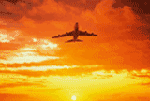The Flight

Long-distance flights often entail poor sleep and long, physically inactive periods in cramped seats where it is difficult to stretch out your legs.
You should regularly stretch your legs and drink plenty of liquids. However, be modest in your consumption of alcohol.
People who have previously had blood clots or whose legs easily swell can benefit from the use of support stockings.
Problems with Ears and Sinuses
Ascent after take-off does not normally pose any problems. Before landing, you might need more active help in order to even out the pressure differences between your inner ear and the ambient cabin pressure. This can be done in a number of different ways, for example, by swallowing or by holding your nose and “blowing”. If you have a cold, or have an ear or sinus infection, it may be problematic to even out the pressure and it can result in pain. In such cases, you should consult with a physician prior to your flight. Sometimes, nose spray/drops can substantially help with the problem.
Children can become uneasy upon take-off and landing due to the changes in the cabin pressure. A little drink can ease the ears, but it should only be given to children who sit up, otherwise the liquid can enter the middle ear from the throat.
Infants younger than one week old or those who were born prematurely should not fly at all.
Pregnancy
Pregnancy greatly increases the risk of blood clots in the leg, a risk that is not diminished by sitting still during a long trip. You can counter this by regularly (a few times per hour) getting up to stretch your legs and move around the cabin. Be sure to use compression stockings.
Jet lag
Many physical functions can easily become disordered during longer flights eastward or westward, as there is a shift in the time of day. This interruption in rhythm in combination with physical or mental stress in connection with the trip causes many passengers such things as a loss of appetite, difficulties in concentration and above all fatigue during the day or insomnia at night - what is known as jet lag.
Long Trips Westward
The direction in which we fly is very important. It is most often found easier to get over jet lag when travelling in a westward direction, for example from Europe to the United States. You are then flying clockwise, which means that the day is prolonged.
Try to adapt to the new local time. You will likely be quite tired as the day / evening goes on, but hold out and try to go to bed at a “normal” local time.
It is likely that you will wake up very early the next morning, feel rather alert, very hungry and furthermore feel a strong need to relieve your bladder. Your body is still set to European time, and it is almost "time for lunch". When you wake up this early in the morning, it might be a good idea to have something simple to eat. Then try to go back to sleep!
This pattern is usually repeated for the upcoming days as the effect gradually tapers off.
Long Trips Eastward
It can be considerably more difficult to adapt after a trip eastward, for example, from Europe to Thailand. Most flights leave in the afternoon or evening and then you have already been awake all day. Since you are flying anti-clockwise, night time and your sleep lasts only a few hours. Upon arrival, you then have an entire day ahead of you, and in this state it can be very trying to stay awake all day until the evening. The best advice is therefore to get to your hotel and place a “do not disturb” sign on the door and have a nap for an hour or two. Then go for a walk in the daylight in order to perk yourself up.
The next day, you will get up rather early and adapt to the local rhythm of the day. Expose yourself to some sunlight in order to adapt more quickly - sunlight has an invigorating effect!
Brief Stay at the Destination
During long flights when your stay at the destination will be brief - perhaps only one or a few days - it is better to stay with your European day rhythm.
Also avoid the invigorating effect of the sunlight by wearing sunglasses right from when you step off of the aeroplane.
